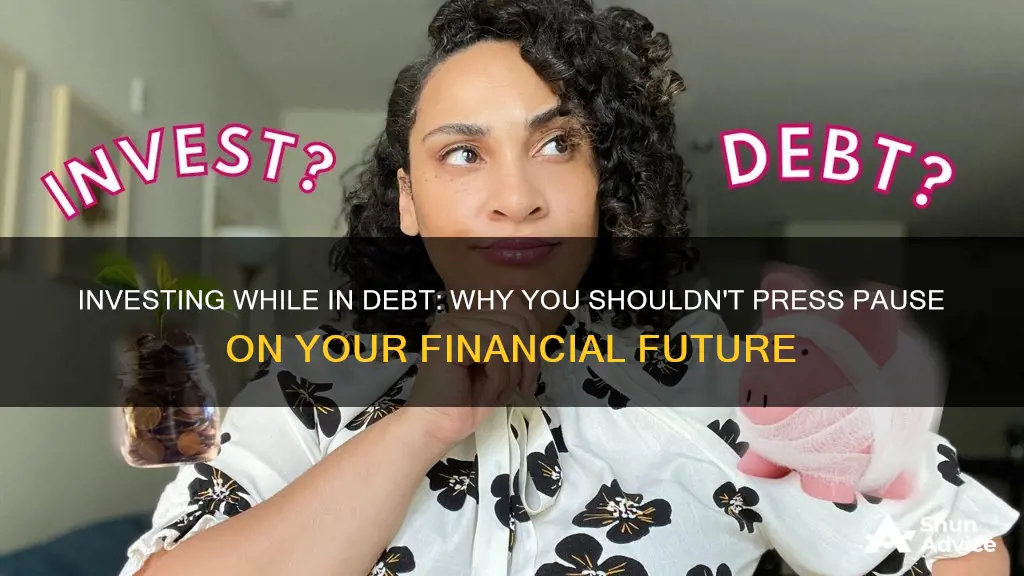
Investing while paying off debt is a challenging but rewarding endeavour. It can be difficult to decide whether to pay off debt or invest, as both are important financial goals. However, investing while paying off debt can be a good strategy for achieving both short-term and long-term financial goals.
The key to deciding whether to invest or pay off debt is to consider the interest rates on your debts and the potential returns on your investments. If you can earn a higher return on your investments than the interest you are paying on your debts, then investing may be a good option. Compounding interest on investments can also help your money grow faster.
Additionally, paying off high-interest credit card debt should be a priority. Credit cards often have high-interest rates, and failing to pay them off can lead to a cycle of increasing debt. It is also important to consider your risk tolerance and peace of mind. If debt is causing you stress and anxiety, paying it off sooner may be the best option.
Overall, investing while paying off debt can be a balanced approach to achieving financial goals, but it is important to carefully consider your individual circumstances, budget, and financial priorities when making this decision.
| Characteristics | Values |
|---|---|
| Interest rate on debt | 6% or greater |
| Interest rate on investments | Less than 6% |
| Tax advantages | Student loan interest and mortgage loan interest are tax-deductible |
| Risk tolerance | Comfortable with the gamble of the market |
| Credit score | A low credit score can affect future loans and interest rates |
| Retirement timeline | Avoid bringing debt into retirement |
| Emergency fund | Save 3-6 months' worth of expenses |
| Retirement plan matches | Don't skip on company retirement plan matches |
| High-interest debt | Pay off high-interest debt before investing |
| Peace of mind | No price tag on peace of mind |
What You'll Learn
- Compounding interest: Investing early lets you take advantage of compounding interest, which is interest earned on interest
- Tax benefits: Certain types of debt, like student loans and mortgage loans, offer tax benefits
- Credit score: Paying off debt can improve your credit score, which is important for taking out future loans
- Peace of mind: Paying off debt can reduce stress and anxiety, and give you peace of mind
- Emergency fund: It's important to have an emergency fund for unexpected expenses, which can help prevent you from taking on more debt

Compounding interest: Investing early lets you take advantage of compounding interest, which is interest earned on interest
Investing early lets you take advantage of compounding interest, which is interest earned on interest. The earlier you start investing, the more time works in your favour. For example, if you open a Roth IRA at 25 and commit to the annual contribution limit of $6,000 per year with a 7% annual return, by the time you turn 65, your money will have grown to $1.28 million, thanks largely to compounding interest.
If you wait five years to start investing until you pay off your debt, you could potentially lose out on nearly half a million dollars. Compounding interest can significantly boost investment returns over the long term. Over 10 years, a $100,000 deposit with a 5% monthly compound interest rate would earn about $64,700 in interest. In contrast, a 5% simple annual interest rate would earn $50,000 in total interest.
The power of compounding helps a sum of money grow faster than if just simple interest were calculated on the principal alone. The greater the number of compounding periods, the greater the compound interest growth will be. For savings and investments, compound interest is beneficial as it multiplies your money at an accelerated rate.
Compound interest is calculated by multiplying the initial principal amount by one plus the annual interest rate raised to the number of compound periods minus one. The formula for calculating compound interest is:
Compound interest = [P (1 + i)n] – P
= P [(1 + i)n – 1]
Where i = annual interest rate, and n = number of compounding periods.
For example, a 3-year loan of $10,000 at a 5% interest rate, compounding annually, would result in $1,576.25 of interest.
The Rule of 72 is a useful rule of thumb to estimate compound interest. By dividing 72 by your rate of return, you can estimate how long it will take for your money to double in value. For instance, if you have $100 earning a 4% return, it would take 18 years to grow to $200.
Compound interest is a powerful tool for building wealth over the long term and mitigating wealth erosion risks, such as increases in the cost of living or inflation. It is a central factor in increasing wealth and an important consideration when deciding whether to pay off debt or invest.
The Smart Money Move: Pay Off Debt or Invest?
You may want to see also

Tax benefits: Certain types of debt, like student loans and mortgage loans, offer tax benefits
When deciding whether to pay off debt or invest, it's important to consider the benefits and potential drawbacks of each option. One key factor to take into account is the tax benefits associated with certain types of debt.
Student loan interest and mortgage loan interest, for example, often come with tax advantages. These types of interest are tax-deductible, reducing your taxable income for the year and resulting in less of your money going to the IRS. This is an important consideration when deciding whether to prioritise paying off debt or investing.
Additionally, if you have multiple debts, it's generally recommended to focus on paying off high-interest debt first, such as credit card debt, which typically has higher interest rates than investments can offer. By paying off these high-interest debts first, you can save money on interest and improve your overall financial situation.
However, it's important to note that everyone's financial situation is unique, and there is no one-size-fits-all solution. The best course of action may be to consult with a financial advisor or tax professional to determine the best strategy for your specific circumstances. They can help you navigate the complexities of debt management, investing, and tax benefits to make the most informed decision.
Who Manages Their Own Investments?
You may want to see also

Credit score: Paying off debt can improve your credit score, which is important for taking out future loans
Credit Score
Paying off debt can improve your credit score, which is important for taking out future loans. A higher credit score can open the door to better loan terms and easier approval. It can also lead to lower interest rates, saving you money in the long run.
Your credit score is a measure of your financial health and ability to manage debt. It tells lenders how responsibly you use credit. The better your score, the more likely you are to be approved for loans and new lines of credit. A good credit score can also lead to lower interest rates, saving you money when you borrow.
Paying off debt, especially high-interest credit card debt, can be a smart move to improve your credit score. This is because your credit score takes into account your credit utilisation ratio, which is the amount of credit you are currently using compared to how much credit you have available. By paying off debt, you reduce the amount of credit you are using, which can lead to a higher credit score.
Additionally, paying off debt can improve your credit mix, which is another factor considered in credit scoring. Lenders like to see that you can manage a variety of different types of debt, including revolving credit (such as credit cards) and installment credit (such as loans).
However, it is important to note that paying off debt may not always instantly increase your credit score. In some cases, it could even temporarily ding your credit score, especially if you close certain lines of credit or pay off your only installment loan. Nevertheless, the positive effects of reducing your debt will generally outweigh any short-term negative impact on your credit score.
Beanie Babies: A Collectible Craze
You may want to see also

Peace of mind: Paying off debt can reduce stress and anxiety, and give you peace of mind
Peace of Mind: Paying Off Debt Reduces Stress and Anxiety
Being debt-free is a significant financial milestone that can bring peace of mind and a sense of accomplishment. While it is often advisable to invest extra cash, paying off debt, especially high-interest credit card debt, can provide several mental and emotional benefits.
Firstly, it can reduce stress and anxiety by eliminating the burden of monthly debt payments. This can be liberating, as individuals no longer have to worry about making minimum payments, falling behind on bills, or arguing with partners about finances. It allows people to redirect their money towards savings or other financial goals.
Secondly, paying off debt improves cash flow and financial control. By reducing debt, individuals gain more control over their money and can allocate it according to their preferences. This increased cash flow can provide a sense of financial freedom and security, enabling individuals to cover their basic living expenses and plan for the future.
Additionally, debt repayment improves credit scores, which is crucial when applying for loans or renting an apartment. A good credit score can also lead to lower interest rates on future loans and improve overall financial health.
Moreover, paying off debt can be a weight off one's shoulders, providing a sense of relief from the guilt associated with past financial mistakes. It empowers individuals to take control of their finances and work towards achieving their financial goals.
Finally, becoming debt-free can open up new opportunities. Once individuals are no longer burdened by debt payments, they may feel more confident to take on new career risks, pursue business ideas, or plan for significant life experiences, such as travelling or saving for their children's education.
Invest in Wells Fargo: Now or Never?
You may want to see also

Emergency fund: It's important to have an emergency fund for unexpected expenses, which can help prevent you from taking on more debt
While it may seem counterintuitive to save when you're in debt, having an emergency fund is crucial to prevent you from taking on more debt. Here's why:
Unexpected expenses will arise, and without an emergency fund, you may have to resort to high-interest credit card debt or loans to cover them. For example, if your car breaks down, you can pay for the repair with cash from your emergency fund instead of taking out debt and paying interest on it. This fund can also help you stay afloat during challenging times, such as sudden job loss, by covering monthly expenses like rent and utilities.
How much should you save in your emergency fund? Generally, it's recommended to have three to six months' worth of living expenses set aside. This amount can vary depending on your personal financial situation, but it's essential to ensure you have at least a small cushion to fall back on.
If you're already in debt, how do you build an emergency fund? Start by creating a budget that outlines your income and expenses. Look for areas where you can cut back, such as subscriptions or memberships you no longer need. Set a goal for your emergency fund, starting with a small, achievable amount and working your way up.
Remember, paying off debt and investing in an emergency fund don't have to be mutually exclusive. You can do both simultaneously. Focus on paying down high-interest debt first, and consider options like debt consolidation or balance transfers to make it more manageable. Building an emergency fund ensures you're prepared for unexpected expenses and helps you stay on track financially.
Paycheck to Paycheck: Strategies for Investing on a Tight Budget
You may want to see also
Frequently asked questions
Investing and paying off debt are both good uses for any spare cash. If you can earn more on your investments than your debts are costing you in interest, investing makes sense.
If you have high-interest debt, such as credit card debt, it often makes more sense to focus on clearing that first. However, if you have a low-interest loan or credit card, you can invest your money instead and let it earn more money faster than interest accumulates on your debt.
The sooner you eliminate debt, the less interest you will have to pay. Paying off debt can also improve your credit score, which is important if you want to borrow money in the future. Additionally, being debt-free can be a significant source of stress relief.
One of the biggest advantages of investing early is compounding interest – the interest earned on your interest. The longer you invest, the more time your money has to compound. Investing early also means you won't miss out on years of building wealth.
Yes. It is possible to invest and pay off debt simultaneously. This involves creating a detailed budget and finding extra money to put towards your financial goals. You can also consider taking on a side hustle to increase your household income.







